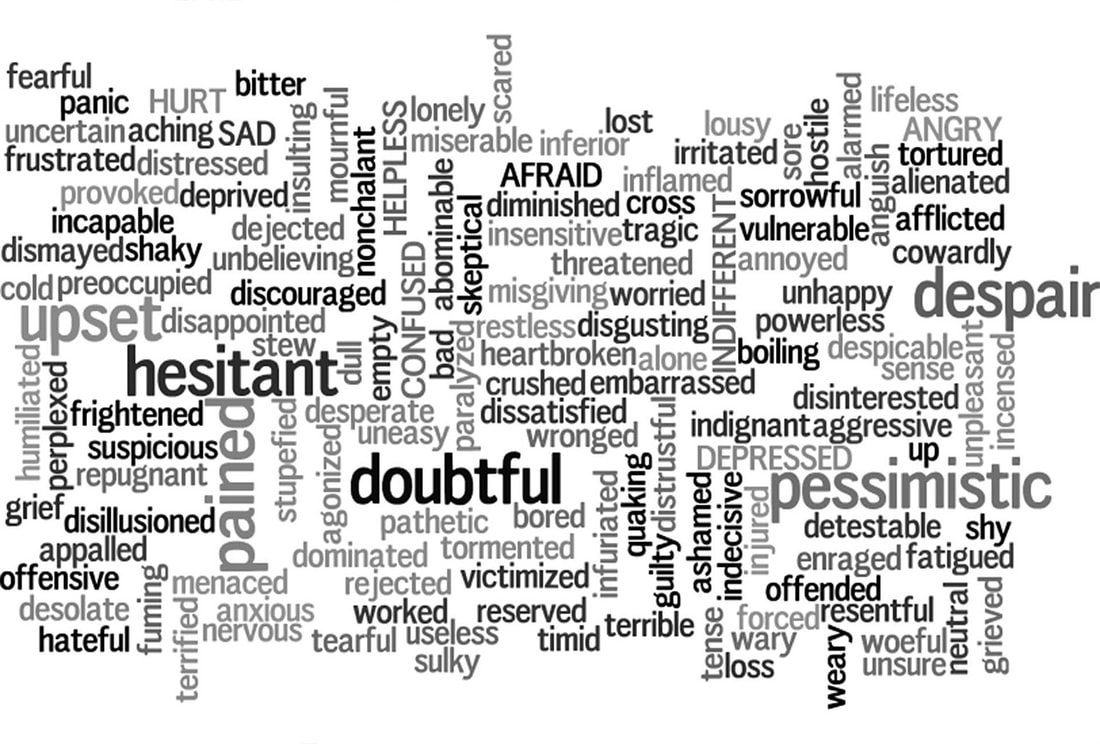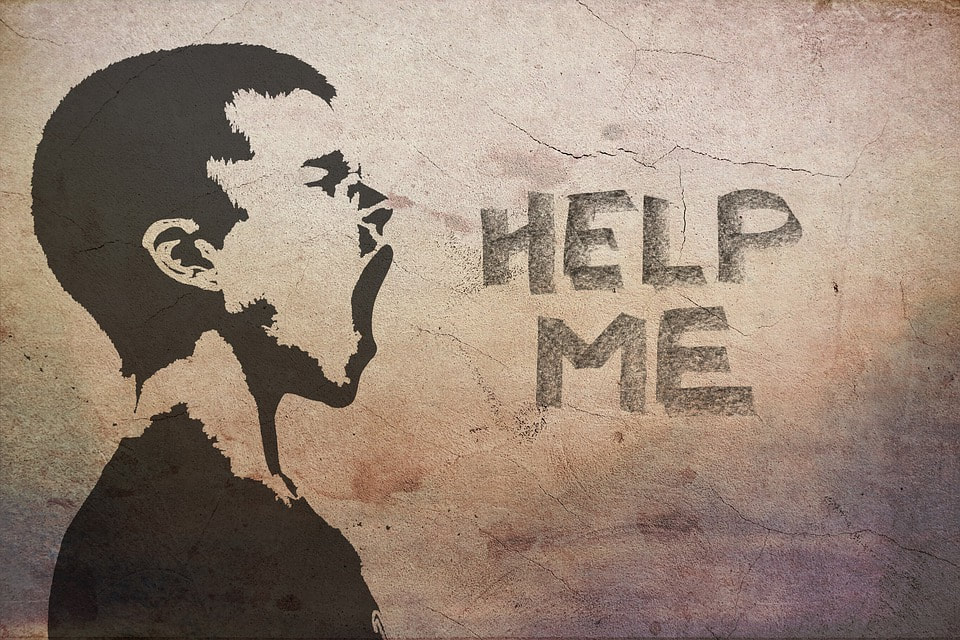Danny's Blog |
 I offer you another observation and lesson learned about grief and deep pain. We live in a world where people are not used to silence or comfortable with it. We are constantly watching videos on our phones or tablets or computers or watching TV. Or we have our headphones plugged in listening to music or a podcast or an audiobook. Very rarely do we take time to experience complete silence and quietude. Thus, when silence and quietude occur, we become uncomfortable. So go with me in your imagination to a time when a friend or family member has just experienced grief and deep loss. You go to comfort them, and frequently there will be silence at that point. The grieving person possibly doesn’t know what to say. And you as the comforter don’t know what to say. In the silence you become uncomfortable. As the silence continues, you grow more and more uncomfortable and begin to focus on your discomfort, rather than the person who is grieving and in pain. Being unable to endure the quietness any longer, you say something to break the silence. And invariably what is said comes out wrong or is hurtful to the grieving person. Think of an earlier blog where I related the time where someone told me, “Danny, I know how you’re feeling. My cat died last month.” A very wise friend of mine, Vietnam-era Marine John Bishop, used the following words in an email he sent after my brother died: “At times like these, few words are the best. And the best words are the Word.” I realized that my wise friend got it. He understood that I was going through the raw pain of my brother/best friend’s passing. He didn’t try to say something cool to feel good about himself. And he was comfortable with silence. In fact, I’ve shared John’s same words many times since—when I’ve spoken with or written to another person going through the raw pain of a tough time in life and he/she is in the desert. So I would recommend you compose your own version of these words and use them when reaching out to someone going through a tough time of deep loss and grief.  Continuing with another lesson learned about tough times in life. I’ve seen it twice now with people trying to comfort me. And I was likely the same way before I experienced deep loss multiple times along my journey. It is most commendable that people want to comfort others going though tough times. And for that thought/intention, I’m grateful. On the other hand, I’ve seen that so often people are busy when they try to come alongside a hurting person. For death never comes at a “convenient” time for those left behind as well as those in the circles of relationships of those left behind. Here is what I’ve seen as typical from others coming alongside me. The individual will call, email, text, etc. and say words like the following: “Danny, I’m so sorry for what you’re going through. You’re a strong man and you’ll get through this. Here is one of my favorite verses. Let me know if there is anything I can do to help.” Then I never heard from them again. I was grateful that the person acknowledged the tough time I was going through. What I found annoying and even angering were the words “You’re a strong man.” At that point in time I did not feel like a strong man—nor was I a strong man. In fact I was feeling as weak as could be. So just saying some cool catch phrase was more harmful than just ending after “Danny, I’m sorry for what you’re going through.” Then the words “You’ll get through this” were most annoying and angering. Had the person saying that phrase suddenly become all-knowing like God? Did they knew that I would get through it? With grief and deep loss, I was just trying to get through a minute or an hour or a day at a time. I could not even think about months from now. Again, don’t just say something that sounds cool because you don’t know what else to say or you’ve heard others say that phrase. Twice in my times in the desert, I have wrestled with the following concept: was I going to keep trusting God through this and in the aftermath. The raw pain and anguish were overwhelming. Each time as I processed through my grief, I recognized that God was my only recourse. There was no proverbial “Door #2” or “Door #3” options that would truly help me. But it took me time to get there. Thus, in the initial raw grief, when people threw out their favorite verse in their “drive-by-comforting-Danny,” I didn’t want to hear it. Therefore, dumping-off a favorite Bible verse may not provide the comfort you’re intending for the hurting person. Consider circling back in the days, weeks, months in the future and then provide that verse that has comforted you. And to make matters seemingly worse, not hearing from the individual again made me feel abandoned. Why didn’t he/she check on me two weeks later? Or a month later? Thus, I realized that in succumbing to busyness in their lives, many people are proverbial “box checkers.” They contacted me, said their pat phrases, shared a Scripture, and then swooped out. They checked the box that they had comforted Danny White. So he’s now good to go. Checking that box made them feel good, but did not do the same for me. Their words caused hurt and anger. I’ll never forget the few people who checked on me two weeks after the funeral, a month later, then again in two months, and even up to a year later. In fact two of my friends wrote on their calendars, the deaths of my two family members and then contacted me every year on that date to see how I was doing. And that has meant so much to me. They let me know that they remembered and that I hadn’t been forgotten about by every other human being. So are you too busy to provide comfort in multiple touch points by checking in on the grieving person in the days, weeks, and months after his/her deep loss? I hope not—for when you’re in his/her shoes, you’ll likely wish someone would do the same for you.  In writing these lessons learned, I’m not trying to “get even” or hurt anyone that hurt me with something they said or did. As my wife Nora has taught me in our marriage: think the best of people, not the worst. Thus, to think the best of people who I have encountered in my various times in the desert (i.e., tough times in life), I believe that they were trying to help me in my grief/loss but didn’t know how to help. Many of them had never experienced a tough time in life and had no frame of reference. Or it at least seemed like they had not experienced a tough time. Yet for the fact they wanted to help, I’m most grateful. Because I was in the same boat, proverbially speaking, before 14 December 1997. I had never experienced a really hard time in life before my pregnant wife and son died. My paternal grandfather and maternal grandmother had died in 1985 and 1989 respectively. But both had been in pain and discomfort before dying so I was actually relieved that neither one of them was suffering anymore after they passed away. God had healed them in Heaven, not on earth. In the aftermath of Jenny and Danny and Unborn Baby’s deaths, I learned that I didn’t want to hear words like “I know what you’re going through. My cat died last month.” Those words were hurtful and seemingly clueless about my situation. I had lost a wife, a son, and an unborn baby. Losing a cat doesn’t come close in comparison. Then I began to realize that the words “I know what you’re going through” are not helpful. In fact, these words are a lie. No one knows what another person is going through. Only God knows. And He is ready to help and comfort. I began to intentionally use the words, “I understand what you’re going through” after I met a fellow human being who had lost a family member or was experiencing deep loss. Lest you think I’m splitting hairs between the words “know” and “understand”, I am not. Since words have meaning, I looked up the definitions of know and understand and realized that “understand” is more accurate when talking with someone going through grief. Even if someone is experiencing the loss of a spouse or a child or an unborn baby, it is highly likely his/her circumstances are different than the circumstances I faced in December 1997. Thus, I can’t know what he/she is going through. But I can understand that he/she is grieving and in raw pain. And I can have empathy with them…not just sympathy.  After my pregnant wife Jenny and five-year-old son Danny died in December 1997, two mentors in the Marine Corps gave me a copy of Dr. Jerry Bridges’ book Trusting God: Even When Life Hurts. (I highly recommend this book to you—particularly if you’re going through a tough time right now.) Dr. Bridges, now at home with the LORD, had experienced many difficult things during his life…physical ailments, deep loss, etc. He wanted to know what God had to say in His Word about tough times in life and how to get through them. In his book, Bridges made three main points: 1) God is completely sovereign, 2) God is infinite in wisdom, and 3) God is perfect in love. After reading this book, I began to learn that even though I didn’t know why my wife and son and unborn baby had died, there is a God, who is good, who I could trust, and who would help me through that time in the desert. I began to grow closer and closer to the LORD—closer than ever before. In fact, I didn’t know that you could be that close to God. He was faithful to give comfort and strength to keep taking one more step, one day at a time. One of those mentors, retired Marine Colonel Brad Lapiska, who gave me Trusting God, recommended that I get into the book of Psalms and read each morning until I read the one verse that I could hang on to in order to get through that day. And he recommended that I keep a journal to be able to look back on this time of difficulty and have a written record of God’s comfort and faithfulness in an up-close and personal way. I’m glad that I listened to Brad, for I would not take a gazillion dollars for that journal that I started in December 1997. It is a reminder of how God was being the Marine Corps motto of Semper Fidelis (“Always Faithful”) to me each and every day. Before 14 December 1997, I knew in theory that God is faithful to His children. After December 14th, I knew in a very personal way that God is faithful. Thus began a study of grief and tough times of life. Thus far, I’ve only shared a few of these lessons learned when speaking in front of audiences and in my book. I hope to be able pass along more lessons learned in this forum in order to help more people.  Thus, at this point along my journey, I’m struggling again with a seeming “one-two punch” of grief and deep loss. As background, in December 1997, I buried my pregnant 26-year-old wife Jenny and five-year-old son Danny—killed in a single-vehicle accident during a military move when I was serving on active duty in the Marine Corps. in November 2012, just after I retired from the Marine Corps, my 68-year-old mom died. Then in early January 2013, my 41-year-old brother (and best friend) died. So these were one-two-three and one-two punches of grief and loss with loved ones dying. Then this year (2022), in January, my 16-year-old nephew was killed in a car wreck in North Dakota and then in early February, my 76-year-old dad died. Another “one-two punch” of dealing with grief and loss. A mentor, retired Marine Colonel Brad Lapiska, told me months after my brother died, “Danny, for a man of your age, you have more Purple Hearts of suffering than anyone else I know. You owe it to the rest of us to share what you’ve learned.” I did not immediately pursue that advice, for I was working on the first printing of A Widower’s Walk. Then became busy with other duties and life. Now with this recent one-two punch of loss and grief, it’s hit me that it is time to begin sharing what I’ve learned about dealing with the tough times we encounter in life…or “times in the desert” as Ray Vander Laan, another mentor on my faith journey has called it. I hope to eventually compile these blogs into a book to share with my future grandchildren (none as of the date of this blog) so that they will be encouraged when they face times in the desert. And they will know how to help others going through tough times. As I began processing my grief after my nephew and father’s deaths, I again realized that many don’t know what to say or how to help someone going through a tough time in life because they have never been through a tough time. They want to help, but don’t know how. So there will be some of those lessons learned as well. Admittedly I am only one data point and different than others. Yet, my lessons learned are those that I know and have experienced. They don’t come from a book or some theory I have come up with or another person’s theory that I’ve read or heard. Thus, they align with Thomas Myerscough’s quote: “He that has an experience is not at the mercy of a man who merely has an argument.” Thus, I offer my multiple times of experience with grief and deep loss to try to help others and not cause them to be at mercy of someone who just has a theory.  For most of my earlier blog posts, I’ve shared excerpts from my book A Widower’s Walk: From Desert to Destiny, and likely you’ve gotten a sense of a few of the lessons learned or experiential wisdom I’ve picked up along life’s journey. Recently, I was talking with a friend about future blogs in this forum, and he advised me: “Just blog about life.” That statement truly resonated with me. There’s no need to look for the latest leadership fad or quote. Or come up with a pithy quote. Plus, I am most grateful when people are “real” with me and not superficial or trying to get me to purchase something or hire them or ________________ (fill in the blank). My friend also reminded me that others want to know that they are not alone in their struggles in life. Many times I’ve read other people’s words, and everything written is positive...nothing negative is mentioned. Another friend told me that those people just talking only about the positive are trying to show their “Facebook life” where everything and everyone is perfect. But life is not like that. All of us have struggles. A quote that I’ve liked and rings with truth is attributed to Thomas Myerscough: “He that has an experience is not at the mercy of a man who merely has an argument.” As you’ll see in upcoming blogs, I make the case that I have had multiple experiences with grief and deep loss. I do think we all want to know that we’re not alone in our struggles... someone else out there has had either the same struggle as we’re having too. Also, I believe that Satan, the enemy of our souls, wants us to believe the lie that “You’re a freak...you’re the only one having this problem...no one else has this problem.” And we fall in to the trap of isolation, rather than being in community with others who will help us—if we’re willing to tell them about what we’re struggling with. Thus, in this forum, I reaffirm my commitment to be real and transparent with you, gentle reader, and bring you encouragement. And to let you know that you’re not alone in life’s challenges. Thus, ultimately to bring honor to the LORD as He has been the One that has helped me.  There Was No Response. No One Answered. No One Paid Attention. Recently I was reading a well-known passage from the Bible about the story of the prophet Elijah confronting the prophets of the false god Baal and false goddess Asherah. You can also read it in I Kings 18. Allow me to set the scene. Elijah has said there would be no rain—and there was no rain for three years. After the three years had passed, Elijah told the wicked king Ahab to assemble the 450 prophets of Baal and the 400 prophets of Asherah on Mount Carmel, along with the citizens of the kingdom Israel. Elijah challenged the prophets of Baal to a contest: the god who answered the prophet’s/prophets’ prayers with fire would be the true God. Elijah allowed the prophets of Baal to go first—and Scripture said they started in the morning. They took a bull, butchered it and put it on their altar. Then they called out to their false god Baal to answer with fire. They continued past noon until nearly 3:00 PM in the afternoon. Then there’s this phrase in the latter part of I Kings 18:29: “But there was no response, no one answered, no one paid attention.” Even though I’ve read this passage and heard it taught/preached many times, those words leapt off the page to me a few days ago. First, it’s so sad to think about those false prophets being deceived by the devil to worship a false god. A god who did not respond to them. A god who did not answer. A god who did not pay attention. Then, it hit me that as Christians we are so blessed. We have a God who does respond. We have a God who does answer. We have a God who does pay attention. I hope that, as you and I remember Jesus’ sacrificial death for us over 2,000 years ago, we will be thankful that He made it possible for us to be cleansed from sin and have a relationship with God as our Heavenly Father and Jesus as a our Savior and Holy Spirit to guide us. Thus, we have a God (and Heavenly Father) who responds to our prayers. We have a God who answers our prayers. We have a God who pays attention to us His children and to our prayers.  Yehundi Menuhin, a classical violinist, said, “Only satisfaction and lack of desire will limit your improvement and ultimate perfection.” From my perspective, this quote defines what a professional is—one who conducts an after action review (AAR) to assess how his or her day, project, or even life went … and how to improve. Not someone who is content to rest on his or her laurels. Or hope that good enough this time will be enough for the next project. The best unit I was honored to serve with followed this process relentlessly. No, we initially didn’t like to admit that we had made mistakes or could have done something better. But ever so slowly, by taking the time to assess our major operations and finding at least one way to improve, we began to get better and better at providing support to our customers. Until our unit was noted as being the best out of twelve in a major command. In fact, we realized that we needed to record our lessons learned in writing, due to the high turnover rate we had with the overseas assignment policy. In turn, we created a standard operating procedures (SOP), and each time we conducted an AAR, we reviewed the SOP. The assigned AAR note taker would compare our most recent lessons learned after an operation to the SOP and update the SOP, then notify our unit of the changes to be implemented the next time. A mentor’s advice emphasized this point to me as a young officer when he said, “Make your duty station and your assignment better than when you arrived.” This requires investing yourself—or said another way, leaving “part” of yourself at a location when you leave. I observed that some “just showed up to work,” day in and day out. No passion. No desire to make things better for those who would come after them. They had a short term view—it’s only about me and my success. Often, they would only put a band-aid on the problem, hoping that that would take care of the issue long enough until they left and the next person had to deal with the root of the problem. Thus, they kicked the can down the road. Yet, how do you know how to do your job when you’re brand new? Next time we’ll look at one technique, which at least, will help those who follow you and could help you. Self-Improvement: Part 2 Several times, I would not find a turnover folder prepared by my predecessor and thus would not know the expectations of my assigned duties, who to contact for help, what reports were required and their due dates,, etc. Thus, I was navigating blindly, hoping that I would have a “grace period” to figure out what was expected of me. It would have been easy to figure out the duties during the “grace period” and perform as well as possible while assigned to a particular billet. And then depart without creating a turnover folder and help set up my successor to succeed. Yet is that making the duty station better than I found it? The first draft of a turnover folder will not be perfect. However, it’s a start for your successor, and he or she can update it and pass it along to the next person who will serve there. Yet, it takes time to create a turnover folder—and to do it correctly. However, I propose that it’s time well spent to help out another person. For as I saw in the Marine Corps, the smallest of the Armed Forces, it was a “small Marine Corps” and often you would serve with the same Marines at least one more time. I did not want to face a fellow Marine, knowing that I hadn’t taken care of him or her, like I would have wanted. Another mentor quoted Socrates, who said, “The unexamined life is not worth living.” This Marine pointed out that any point of transition—such as a change of duty assignment, moving to another assignment, deploying, etc.—is an excellent opportunity to examine one’s life. Obviously this requires being intentional about yourself and your life. Not just hoping that things will work out. Or just stumbling along from one transition point to another. He continued with the following questions: Am I content with whom I am becoming? Am I the kind of leader a Marine would want? Am I the kind of Commander a unit would want? Am I the kind of man a woman would want? Am I the kind of husband a wife would want? Am I the kind of father a child would want? Am I the kind of Christian that Christ would want? Am I the kind of Saint that God would want? Another point that encouraged me was this statement, “You will make mistakes in life.” If each of us were honest with ourselves and others, we would admit to this. None of us are perfect. Thus if we accept that statement, then we can deal with it—and learn to forgive ourselves. So what about you, Friend? Have you recognized that there is at least one thing you can do in your home, at work, or in your community on which you could improve? I believe that everyone of us can find one thing to work on—and help make it better for those coming after us, whether it’s next month, next year, or the next generation.  Another point to remember is that even though you are a key member of your organization, you are not indispensable. If you were to become sick for an extended period of time, your team very likely would discover how to get things done in your absence. After Jenny and Danny’s deaths, the Marine Corps reassigned me to an Inspector-Instructor staff in Greenville, South Carolina, to assess my new role as a single parent while exploring the feasibility of still serving as a combat engineer. For four months, I visited various duty stations and met with leaders for advice on whether to resign my commission and get out of the Marine Corps or continue serving. It was an incredible slap of reality that the Marine Corps didn’t stop functioning with Captain Danny White not serving as part of a combat engineer unit. The Corps didn't grind to a halt. In fact, the Corps continued to march along—in fact, not even missing a beat—because Captain White was not on deck. I wish that I had written down this lesson learned and reviewed it consistently after deciding to continue serving on active duty. This lesson learned aligns with an observation I made as a brand new Second Lieutenant and completing my initial officer training at The Basic School (TBS) at Quantico, Virginia. Our TBS class was tasked, as part of our drill and ceremonies training, to put on a sunset parade for retiring Marines. I was selected to serve as a member of the parade staff and was standing out front of the formation in the center of the parade deck. From this position, I could see all the retiring Marines and their families and the medals, certificates, and flags presented to them. One scene, that beautiful August evening, struck me and was forever burned into my memory. I saw a Marine standing by himself when it was his turn to be recognized. (For the record, this Marine may have been single his entire twenty-plus year career.) His retirement orders were read. His retirement award citation was read. The senior officer pinned the medal on his chest then handed him an American flag. Then the Marine stepped off smartly and returned to his assigned seat. I remember thinking, “That would be so lonely to be at your retirement ceremony (after at least 20 years of service) and be standing there by yourself. I want my family to be there when I retire.” What I failed to remember was to write down this significant lesson learned/observation. After joining my first active duty unit, I slowly turned into a workaholic. Then years later as a senior officer, I almost destroyed my marriage due to being a workaholic at the Pentagon. If I had not had a serious wake up call, I likely would have received another promotion and/or another medal, but would have been standing alone at my retirement ceremony—due to losing my family in the process. Having my wife and children by my side at my retirement ceremony will always far outweigh another promotion or another medal. For the medals and rank insignia are packed up in a box in my closet. The relationships with my wife and children continue to grow stronger and stronger, for which I’m eternally grateful.  During my formative years as a young Marine Corps officer, I observed many leaders who were workaholics. Since they were successful, I assumed that I must do the same to be recognized with promotions and medals. During my journey, I had a few—and emphasize few—leaders who cared about me as an individual and challenged me to gain and maintain balance in my life. Unfortunately, I did not understand the importance of this principle. When looking down in the caskets of my pregnant wife Jenny and five-year old son Danny, killed during a single vehicle accident during a 1997 military move, I had waves of regret wash over me. I wished to have those days back of being at work with “busy work” in an attempt to impress my senior leaders. I could not hit “Rewind” then “Play” again on those days of working late at the office. Let me be clear, I’m not advocating shirking your duties in this quest for gaining and maintaining balance. What I mean is after completing your duties for the day, you remain at work for a “good idea” project, then another and another—doing this again and again. As a result of this excessive focus on work, you will fail to have margins in your life and may find yourself experiencing burn out. This point was reinforced during my assignments at the Pentagon. I saw other service members working 15 to 16 hours per day, week after week. Then, when a crisis would occur in the world, these same officers didn’t have any capacity to surge for the long hours of planning for the crisis and/or then standing watch for eight to twelve hours. A way to combat being a workaholic during the time of “normal” operations is to establish margins in your life. This often means learning to say the powerful word “No.” With only 24 hours per day or 168 hours per week, you can’t do everything. To realize balance, you can’t focus just on work. You must consider having some down time, perhaps taking up a hobby or continuing one from years past. One story that helped me to grasp a picture of margins was one my dad told about a man he admired and who helped teach him how to use a chainsaw safely. My dad would remind my brother Jon and me, while we were helping him cut dead trees for firewood to heat our home, of this story when our youthful zeal would overwhelm our better judgment to work steadily. This man, Billy Styles, would accept woodcutting jobs from various people in his rural Mountain View community. Each time before beginning his woodcutting job for a homeowner, Styles would explain that he could cut more wood if the client would allow him to stop every 20 minutes to refuel his chainsaw and sharpen the chain. The wise homeowners would allow Styles to take this break. And Styles would steadily work between breaks and cut stacks and stacks of wood. However, the foolish homeowners would accuse Styles of being lazy and not allow him to stop except to refuel his chainsaw. As the chain became more and more dull, Styles was able to cut less and less wood. He had to work harder and harder with the dull chain to cut the wood. These homeowners failed to realize that this so called “laziness” was actually a help to their bottom line. Styles still got paid the same rate per hour. The foolish homeowners received less firewood while believing he had prevented Styles from being lazy while cutting wood for them. So have you considered analyzing your life for balance? Have you taken time to sharpen your proverbial chain? If not, there may be other impacts on your journey … more next time.  During my formative years as a young Marine, I observed many leaders who were workaholics. Since they were successful, I assumed that I must do the same to be recognized with promotions and medals. During my journey, I had a few—and emphasize few—leaders who cared about me as an individual and challenged me to gain and maintain margins in my life. Unfortunately, I did not understand the importance of this principle. When looking down in the caskets of my pregnant wife Jenny and five-year old son Danny, killed during a single vehicle accident during a 1997 military move, I had waves of regret wash over me. I wished to have those days back of being at work with “busy work” in an attempt to impress my senior leaders. I could not hit “Rewind” then “Play” again on those days of working late at the office. Let me be clear, I’m not advocating shirking your duties in this quest for gaining and maintaining balance. What I mean is after completing your duties for the day, you remain at work for a “good idea” project, then another and another—doing this again and again. As a result of this excessive focus on work, you will fail to have margins in your life and may find yourself experiencing burn out. This point was reinforced during my assignments at the Pentagon. I saw other service members working 15 to 16 hours per day, week after week. Then, when a crisis would occur in the world, these same officers didn’t have any capacity to surge for the long hours of planning for the crisis and/or then standing watch for eight to twelve hours. A way to combat being a workaholic during the time of “normal” operations is to establish margins in your life. This often means learning to say the powerful word “No.” With only 24 hours per day or 168 hours per week, you can’t do everything. To realize balance, you can’t focus just on work. You must consider having some down time, perhaps taking up a hobby or continuing one from years past. One story that helped me to grasp a picture of margins was one my dad told about a man he admired and who helped teach him how to use a chainsaw safely. My dad would remind my brother Jon and me, while we were helping him cut dead trees for firewood to heat our home, of this story when our youthful zeal would overwhelm our better judgment to work steadily. This man, Billy Styles, would accept woodcutting jobs from various people in his rural Mountain View community. Each time before beginning his woodcutting job for a homeowner, Styles would explain that he could cut more wood if the client would allow him to stop every 20 minutes to refuel his chainsaw and sharpen the chain. The wise homeowners would allow Styles to take this break. And Styles would steadily work between breaks and cut stacks and stacks of wood. However, the foolish homeowners would accuse Styles of being lazy and not allow him to stop except to refuel his chainsaw. As the chain became more and more dull, Styles was able to cut less and less wood. He had to work harder and harder with the dull chain to cut the wood. These homeowners failed to realize that this so called “laziness” was actually a help to their bottom line. Styles still got paid the same rate per hour. The foolish homeowners received less firewood while believing he had prevented Styles from being lazy while cutting wood for them. So have you considered analyzing your life for balance? Have you taken time to sharpen your proverbial chain? If not, there may be other impacts on your journey … more next time.  Remember is a powerful word. You may recall a significant date in your life by reflecting on where you were and what you were doing. A few of you may remember where you were when you heard about the Japanese attack on Pearl Harbor on December 7, 1941. More will remember where you were on November 22, 1963, when you heard that John F. Kennedy was assassinated. Many will recall what you were doing on September 11, 2001, when you first heard about multiple terrorist attacks carried out on our nation’s soil. Other dates became milestones in your life—and the rest of the world is likely unaware of their significances. December 14, 1997, was such a day for me. That day, en route from Bridgeport, California, to Fort Leonard Wood, Missouri, I looked in my rearview mirror and watched my pregnant wife, Jenny, and our five-year-old son, Danny, die in a single-vehicle accident. My squared-away world shattered and disintegrated in mere seconds. One minute, I, a United States Marine, was on my way to attend a military school; the next minute, my high school sweetheart, our firstborn son, and our unborn baby were dead. I remember wondering helplessly, Why did this happen? What will I do? Is there any way I can be a single-parent to three-year-old Hannah and nine-month-old Ethan and still serve as a Marine? Will I make it through this “desert experience”? How? People deal with desert experiences in many different ways. Some opt to escape the pain by ending their earthly lives. They fear their circumstances more than they fear death. It is impossible to fully understand what goes through their minds during their final moments, but it is doubtful that they truly consider the resulting desert experiences they will put their loved ones through. Others use alcohol or drugs to cope with pain, but the anticipated relief is only temporary. The potential effects of either choice can spiral downward and cause a desert experience to worsen. Some seek help from counselors, as they realize that, on their own, they don’t have answers. Others turn to their communities, groups of caring people gleaned from among their families, friends, neighborhoods, and churches. Another way I’ve seen people deal with desert experiences involves turning to their faith journeys and seeking help from God. I wrestled with all those options—and the consequences of each—after that horrible accident on an Arizona highway in 1997. I thought back over the life I’d experienced before tragedy struck. For the first time, I began to see pictures from my life—pictures that helped me see deeper truths. And I remembered lessons learned to help continue to take one more step—one day at a time. Have you heard the expression “Leadership Makes a Difference”—or something similar? What did you think? Did it seem corny or a bit hokey to you? Perhaps just an idea that someone thought up for a poster or a meme?
I’m not sure that I had given that idea much thought much before December 14, 1997. That day, my pregnant wife Jenny and five-year old son Danny died, during a military move. As you can imagine, several friends, family members and Marines called me that afternoon, as I sat in a Kingman, Arizona, hotel room. I was shaken to my core and unsure of what to do. One call I’ll never forget came from the Commandant of the Marine Corps (CMC), General Charles C. Krulak, a four-star general. That December 1997 conversation is seared into my memory and went something like this: (Phone rings.) “Hello, this is Captain White. May I help you?” “Do you know who this is?” “Yes, sir. You’re the Commandant of the Marine Corps.” (I recognized his voice, having heard him speak in videos shown at the Marine Corps Birthday Ball ceremonies.) “I’m very sorry for what’s happened in your life today. My wife and I are Christians, and we’re praying for you. You are going to have needs that we can help you with. Please let us know if you need anything, since we’re not mind readers. Will you promise me that?” “Yes sir, I will.” “And, Captain White, take as long as you need to make your decisions.” We talked perhaps a minute more and said goodbye. I sat there for a moment, awestruck! How did the Commandant get my number? And the Commandant had called me—because he was a Christian and a Marine! This was the equivalent of the CEO of a 175,000-person organization calling a hurting employee going through adversity to see how he was doing. Looking back, even though it was only a three- to four-minute phone conversation, that call threw me a lifeline of hope. A picture—I wasn’t alone. Yet, I can’t imagine what was on General Krulak’s schedule that day as the Commandant. Being responsible for the training and equipping of 175,000 Marines is not an easy assignment on any day of the week. He took time for me and put action into his leadership—not just talking in theory about leadership as the Commandant of the Marine Corps. As time passed, I replayed that phone call over and over in my mind and realized anew that leadership does make a difference—a statement many think is just a platitude or a “goofy poster for the break room.” But it wasn’t a platitude as I sat—hurting, shaken, and unsure of what to do—with my three-year old daughter and nine-month old son in that Kingman hotel room. And that day, my life changed. I began to intently study leadership and keenly observe the now-over-300 leaders I’ve served with, instead of occasionally remembering a mentor’s advice from year earlier: to pay attention to every leader you serve with—you can learn as much from a bad leader (i.e., what not to do) as you can from a good leader. So what do you think now? Do you think that positive leadership does make a difference?  When you hear the word “stingy,” what do you envision? Likely, someone who is tight with his or her money. That’s what I usually thought of when I heard that word. Throughout my adult life I had obeyed the Lord, and paid my tithes (ten percent), regularly, to my church at each duty station. However, I had not been generous with the other ninety percent of my income. I focused on my family (a little) and me (a lot) with what was left and had not recognized that all of it was God’s—he had just entrusted it to me. I rarely ever gave an offering in addition to my tithe. I was in a figurative prison: stinginess with my money. That all began to change after a December 1997 accident which claimed the lives of my pregnant wife Jenny and five-year old son Danny during a military move. In mid-January 1998, after helping coordinate the generous gift of two grave plots in the church cemetery (the equivalent of a $6,000 gift), the Faith Temple Church pastor, Rev. Raymond D. Burrows asked me to speak during a Sunday evening service. “Brother Danny, I can preach about God’s faithfulness from the Bible—Paul wrote twice[1] in I Corinthians that ‘God is faithful,’” he said. “But you’re experiencing it right now. A saying[2] I really like is ‘He that has an experience is not at the mercy of a man who merely has an argument.’ Would you please share what you’re learning?” Having spoken only a handful of times in chapel or church services, I felt nervous but agreed to speak on January 11, 1998. To prepare to speak, I turned to a gift, from two mentors, given after Jenny and Danny’s funerals—a copy of Jerry Bridges’ Trusting God: Even When Life Hurts. Bridges’ book enabled me to ground myself with a solid base in the theology of suffering. I realized that God was trustworthy in this desert experience, even though I didn’t understand why it all happened. Trusting God formed the basis of what I learned about God’s faithfulness and what I would share at Faith Temple. The Friday before I was scheduled to speak, my maternal grandfather gave me a $100 bill and said, “Son, I want to help you. I know how expensive funerals can be after your Mima [his first wife] died in 1989.” My grandfather is not a wealthy man; I appreciated his generous gift, for the balance for the two headstones (for my wife and son’s graves) was due the following week. On the Sunday I was scheduled to speak in the evening service at Faith Temple, I sat in the 10:45 a.m. service. Right before the offering, I took a $20 bill from my wallet, placed it in a contribution envelope, and sealed the envelope. I felt pleased to be giving more than just my tithe. I had seen generous people help me with some of the funeral expenses, and I wanted to begin learning this concept. In a quiet, gentle way during the offering prayer, the Lord spoke to my heart, saying, Give me the $100 bill. In my mind I said, No way, Lord! I have to pay off the balance for the grave headstones next week. With that big bill to pay, I need that $100 bill--and a lot more. Tell you what, Lord. I’ll give you a second $20. I took out another envelope, placed both $20 bills inside and sealed it. I felt very impressed with my generosity and negotiation skills with God. Again the Lord spoke: Give me the $100 bill. It seemed so real that I looked around to see if someone behind me was talking during the offertory prayer. No one was behind me. Feeling completely foolish, I took out a third envelope and placed the $100 bill inside. Placing the two $20 bills back in my wallet, I said, Lord, I feel like a complete nut! I hope that that was you speaking to me. I don’t know how I’m going to pay the bill that’s due next week. That evening I shared what God was teaching me during that desert experience with the adversity I was facing. Afterwards, Pastor Burrows said he felt the Lord leading him to take up an offering to help me. There was a small group attending that Sunday evening service, and I assumed the offering would be an honorarium and might replace the $100 I gave that morning. After the service, I scurried in the dark through the rain to my GMC Jimmy and, once inside, turned on the dome light and opened the envelope, which contained a check. Seeing the amount, I began to sob brokenly. The church’s offering was enough—almost to the penny—to pay off the balance for the headstones! I wasn’t alone in the desert I was passing through. I could trust God to provide. Another learning point involved seeing friends associated with The Citadel (my alma mater) organize and contribute to an account that provided funds to help me with funeral bills. God was living up to one of his names: Jehovah-jireh meaning The LORD who provides. And that wasn’t the last learning point in my process of being freed from bondage to money. Colonel Ahearn, the Chief of Staff at Marine Forces Reserve, contacted me in March 1998, just as he had done almost weekly, to see how I was doing. During that March phone call, we exchanged general information, and he asked me if I had any financial issues. He didn’t accept my nebulous answers and asked point-blank, “Do you have the financial means to pay for the funerals?” I swallowed my pride and admitted, “No, Sir. I do not. I had all the life insurance on me as the Marine. Not on my wife or children” He specifically asked the amount owed for the funerals, and I told him. Within two weeks, he told me to ask the Inspector-Instructor staff, where I was temporarily assigned, for a set of orders to fly to Washington, D.C., to meet with Major General Thomas Wilkerson, the Commanding General for Marine Corps Reserves. After Colonel Ahearn picked me up at Reagan National Airport, we went to lunch and then drove to Headquarters Marine Corps at the Navy Annex. I met General Wilkerson, and he presented me with a check from the Marine Corps Law Enforcement Foundation and another check from the Fisher House Foundation. Through Colonel Ahearn making some generous people aware of my situation, the funeral bills were paid in full! On the return flight to South Carolina, I felt almost as if I didn’t need the plane to fly back. I was ecstatic beyond words to see God being Semper Fidelis (“Always Faithful”) in providing for me when I could do nothing. Having seen God repeatedly take care of my two small children and me increased my faith to trust him with all my finances and to be ready to give as he prompted, in order to help others who might need assistance in the future. So are you ready to trust God and become a generous person—with your money? Do you believe that God will meet your needs if you are generous? Prepare to be amazed at how 90% goes so much further with His blessing than 100% goes on your own. The content of this article comes from A Widower’s Walk: From Desert to Destiny (2014) and is copyrighted by Daniel F. White, II. Used with permission. [1] I Corinthians 1:9 and 10:13 [2] Attributed to Thomas Myerscough  Preciousness of Time When you see someone holding a jar of marbles, do you think “Are you losing your marbles?” then laugh? I used to think the same. Then, a mentor shared a story about a jar of marbles that challenged my perspective on life, particularly after witnessing the deaths of my pregnant wife and five-year old son in an accident during a military move. My only wish is that I had understood the concept earlier. While leading a study tour in Israel, an American named Bill stopped to visit his friend, a Jewish rabbi. Walking into his friend’s office, Bill saw a large glass jar partially filled with a rainbow of colored marbles on his desk. He jokingly asked the rabbi, “What are you doing? Playing marbles with your disciples?” With a smile, the rabbi replied, “No” then continued by quoting Psalm 90:12 (KJV) “So teach us to number our days, that we may apply our hearts unto wisdom.” Pausing momentarily, the rabbi continued, “After hearing these words, I wanted to have a picture of what ‘numbering my days’ meant. Mulling over the thought, I considered my family tree and how long my grandparents and great-grandparents had lived. Taking a calculated guess on my life expectancy, I determined how many days I already had lived. I then estimated how many days I had left and bought that number of marbles and this jar. “Each morning I take a marble from this jar and talk with God. ‘Lord, I bless you for this day. Please help me with all the activities planned for today –the meetings, my classes, etc.’ Putting the marble in my pocket I proceed with the day. “At the end of the day, I take the marble out and have a ‘debriefing’ time with God. ‘Lord I bless You for Your help today. Please forgive me for not being patient during the 10 o’clock meeting. I bless You for helping me teach my disciples.’ After praying, I throw the marble away. With each passing day, the level of marbles in the jar slowly decreases giving me a picture – and a reminder -- that I’m not getting any more marbles.” Do you see the same picture? I truly was blown away realizing that I already had squandered many “marbles” in my life – never to get them back. As I continued mulling over this picture, the “blinding flash of the obvious” hit me: based on my “gene pool,” I had less than half of my marbles left! What would I do with my remaining marbles? I can get more money. I can get more things. I can’t get more time. The corollary to this thought struck me: the most precious gift anyone can give is his or her time! (So “Thank you” for sharing your time and reading this article.) As a lesson learned, I daily carry a marble in my pocket and when, pulling out my keys, see the marble and I’m reminded, “Be wise in how you use today’s marble – yesterday is gone and tomorrow hasn’t arrived.” So are you “losing” your marbles or are you “using” them wisely? The content of this article comes from A Widower’s Walk: From Desert to Destiny (2014) and is copyrighted by Daniel F. White, II. Used with permission. |
Managed by J316 Project
